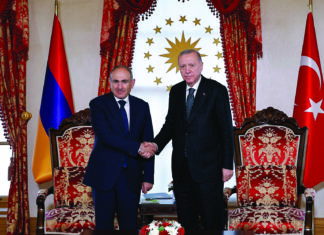As the US reduces its soft power influence, such as through foreign aid cuts via USAID and other institutions, China gains momentum. For three decades, the US was a primary aid provider in the South Caucasus, particularly to Armenia and Georgia, funding local media, NGOs, business projects, state institutions, human rights initiatives, education, etc. Washington used soft power to maintain a regional presence, balancing against Russia and countering Iran. But Donald Trump’s return to the White House shifted Washington’s foreign policy, drastically reducing aid to the world, including South Caucasus countries. This created a power vacuum, and Russia’s constraints offered China an opportunity to increase its own influence in the region, as Washington is not interested in the South Caucasus and Moscow is busy with its own problems. China is skillfully leveraging its momentum.

Azerbaijani President Ilham Aliyev concluded a state visit to Beijing days ago. Azerbaijan signed a comprehensive strategic partnership with China, as Beijing views Azerbaijan as a key partner linking China to Europe through Central Asia and the South Caucasus as a part of the Chinese Belt and Road Initiative (BRI). Baku and Beijing agreed on strengthening cooperation in energy, infrastructure, and digital technologies. Beijing secured investments in the Azerbaijani economy, especially in transportation infrastructure.
By joining the initiative, Azerbaijan will attempt to justify to the international community why it needs the “Zangezur Corridor” and why the interests of all major stakeholders align with its realization. It will likely emphasize Armenia’s opposition to the BRI to justify Baku’s actions against Armenian sovereign territory.
Azerbaijan is seeking to become China’s primary partner in the South Caucasus, demonstrated by its increasing engagement with de facto China-led BRICS and the Shanghai Cooperation Organization. Moreover, following news of Iranian President Masoud Pezeshkian’s planned visit to Azerbaijan, the “Zangezur Corridor” has become the central focus of Baku’s media concerning expectations for the visit. Indeed, Iran continues to assert its firm position against this corridor. In his recent interview the Iranian president stated, “Iran is providing Azerbaijan with a route to Nakhichevan through its territory. Work on this matter is already underway, and an agreement has been reached.” Despite this ostensible agreement, Azerbaijan still insists on opening the Zangezur corridor.
In its turn, Georgia, having lost strategic partner status with the US, now seeks the same opportunity with China. By signing a strategic partnership with China, Georgia aims to attract investment, particularly in strategic infrastructure projects. This move signals a shift from a pro-Western orientation to a balanced foreign policy, engaging with both China and regional players like Russia.








